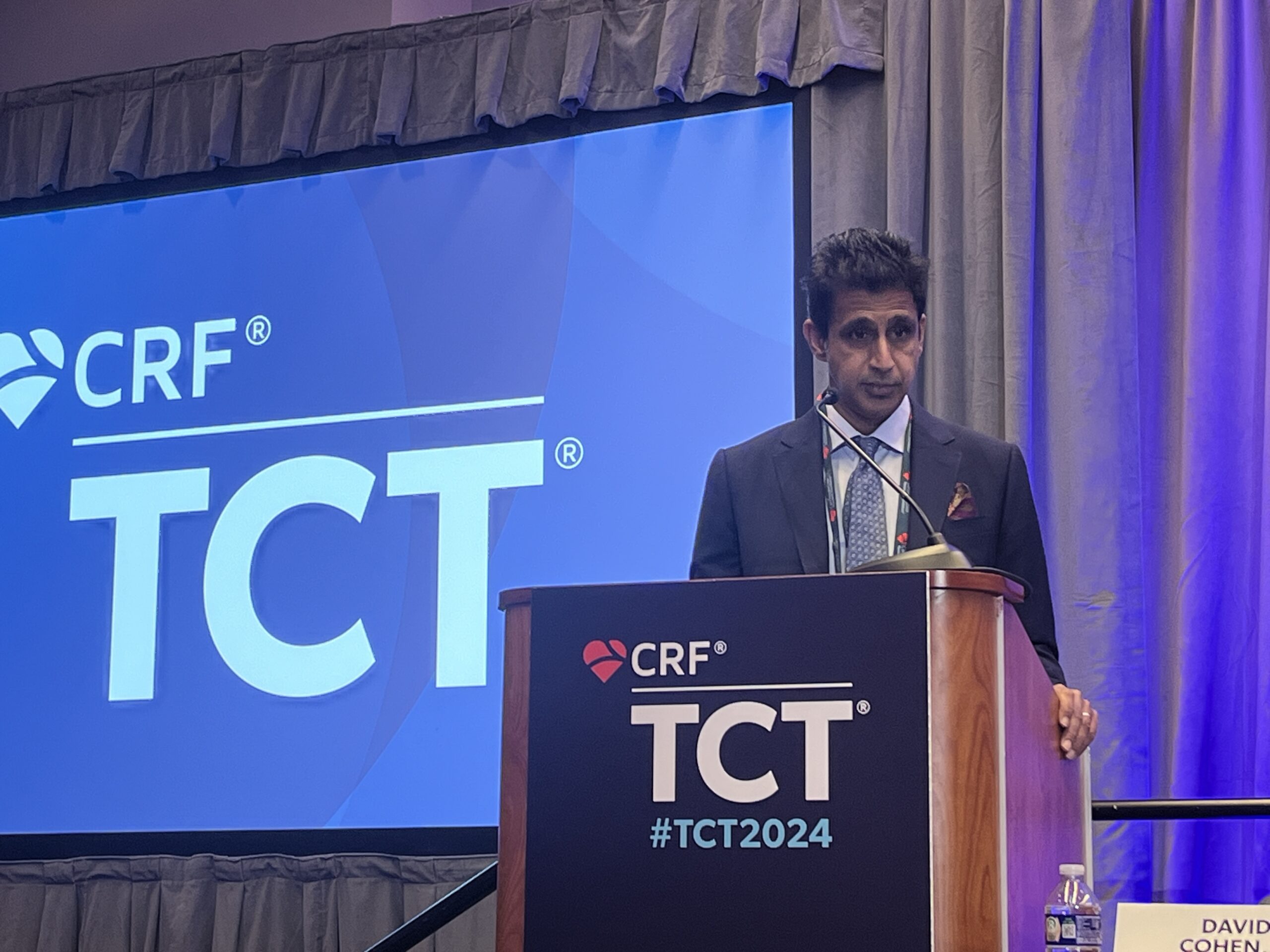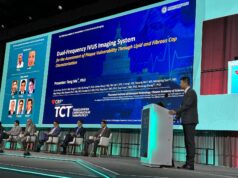
The largest trial to date to study the impact of colchicine—an anti-inflammatory medicine commonly used to treat gout—in acute myocardial infarction (MI) has found that administering a low dose of the drug did not reduce cardiovascular death, MI, stroke or ischaemia-driven revascularisation compared to placebo.
Sanjit S Jolly (McMaster University and Hamilton Health Sciences, Hamilton, Canada), principal investigator in the trial—CLEAR SYNERGY (OASIS 9) —presented results at TCT 2024 (27–30 October, Washington, DC, USA), where he commented that the findings “should give clinicians pause” about whether to use colchicine therapy in their practice.
Colchicine has been touted as a route to improving cardiovascular outcomes in patients with MI by inhibiting inflammation. Two trials—CLEAR and COLCOT—have shown a significant benefit for colchicine for the treatment of coronary artery disease, and have driven its use in the setting of acute MI.
“We designed [CLEAR SYNERGY] prior to these trials and were running this as the largest trial of colchicine in coronary artery disease, with significantly more events and more power than the prior trial,” said Jolly. “We believe it is important to replicate the results particularly for them to change practice and to move a class I indication in the guidelines.”
CLEAR SYNERGY included patients with ST-elevation myocardial infarction (STEMI) or non-ST elevation myocardial infarction (NSTEMI) who were randomised within 72 hours of percutaneous coronary intervention (PCI) to either colchicine or placebo.
Taking place at 104 sites in 14 countries between February 2018 and November 2022, investigators enrolled a total of 7,062 patients in the trial. Following the initial randomisation, subjects were also then randomised to either spironolactone or placebo. Results of the second phase of this analysis will be presented at the American Heart Association (AHA) 2024 scientific sessions (15–18 November, Chicago, USA), with findings due to be published in the New England Journal of Medicine (NEJM).
The CLEAR SYNERGY trial was designed with 80% power to detect a 25% relative risk reduction in the primary outcome, a composite of cardiovascular death, MI, stroke or ischaemia driven revascularisation, as assessed using a Cox proportional hazards model, stratified by STEMI versus NSTEMI and spironolactone versus placebo.
At a median follow-up of three years, Jolly reported that the composite endpoint was not significantly different between the colchicine and placebo groups (p=0.93). Additionally, there were no significant differences in any of the individual components of the composite endpoint. Results were consistent between patients who discontinued the therapy, and those who carried on into the long-term, Jolly revealed.
One area where colchicine was observed to have a significant impact was in a reduction in C-reactive protein (CRP), a marker for inflammation, Jolly detailed.
“There has been a lot of interest in the C-reactive protein as a marker of prognosis, and really a marker of benefit on anti-inflammatory therapies. We found that CRP was high in the midst of the acute MI in both groups, but at three months CRP did go down in both groups, [and] was lower in the colchicine group, so colchicine was effective in reducing CRP.”
Adverse events were similar between both study cohorts except that diarrhoea was more common after colchicine than with placebo (10.2% vs. 6.6%, p<0.001).
“We believe, based on this large trial the role of colchicine post MI and long-term is uncertain,” Jolly commented at TCT 2024, noting that the results have already led him to halt the use of the therapy among patients in his care, despite having once been a “believer” in the therapy.
“On balance when you look at this trial, we didn’t see a reduction in cardiovascular outcomes and unfortunately there was a side effect of the therapy, diarrhoea. As a patient you can decide for yourself, would you want to take this therapy?” he said.
Ajay Kirtane (Columbia University Irving Medical Center/NewYork-Presbyterian Hospital, New York, USA) went further, describing the results as “a big deal” and highlighting the lack of an association between the reduction of the inflammatory marker—CRP—and the clinical outcomes observed in the trial.
“When we talk about patients after an MI, you want to make sure they are taking their antiplatelet therapy, you want to make sure that their LV [left ventricle] is supported with all the guideline-directed medical therapy,” he said. “This medicine is not well tolerated, [and] the data previously were so-so. Now, with this type of trial, I fully agree that I would not want to start it [colchicine therapy] in a patient.”
Similarly, Wayne Batchelor (Inova Heart and Vascular Institute, Falls Church, USA), said that the trial’s results would limit his use of colchicine post-MI, but said it is important not to dismiss the potential role of reducing inflammation among these patients.
“We have to be careful that we don’t throw the baby out with the bathwater, so to speak,” Batchelor said. “Inflammation post-MI is still a very important thing to study, and to understand the science that underlies it. There is another trial, the ARTEMIS trial, that is using a very potent IL6 inhibitor, ziltivekimab, and that is going to be a very similar trial to this to study the effects of supressing inflammation at a much larger level than colchicine to see how that plays out. I think we have to be careful that we just assume that inflammation doesn’t play an important role.”










